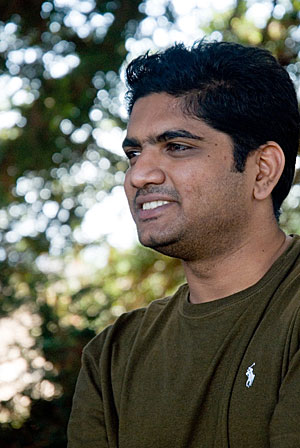Name: Roopesh Sitharan
Age: 30
Degree: MFA
Field of study: Digital arts and new media
Undergraduate education: Multimedia University, Cyberjaya, Malaysia
Hometown: Kuala Lumpur, Malaysia
Most memorable experience at UCSC?
Getting to know all the great scholars and academicians from diverse backgrounds. In particular, I am intrigued by the paradox of being engaged with students as a teaching assistant and with my professors as a graduate student. I get to practice and share what I have learned with fellow undergraduates. It's a great feeling when you get to share your knowledge and enthusiasm with someone.
Favorite spot on campus and why?
My office, overlooking the Pacific Ocean. It is truly soothing and comforting as I grade away papers in my office space. A place of personal serenity, you might say.
How has your UCSC graduate education shaped you professionally?
With the support from the DANM program, I participated in several international art symposia and biennials such as ISEA (Inter-Society for the Electronic Arts) '09 in Singapore and Gwangju Biennale in South Korea. I am now established as a practicing artist and curator from Malaysia, thanks to my professors.
What are your plans after graduation?
I will be pursuing a Ph.D. in visual culture, focusing on curatorial/knowledge at GoldSmith, University of London, this coming September. I think it's a great transition from UCSC.
Accomplishments:
I received several grants from UCSC, such as Regent Fellowship Grant, Porter Fellow-- Graduate Arts Research Grant, and DANM Fund for Excellence. I won second place for the ASEAN New Media competition in Indonesia and curated several national and international exhibitions as a graduate student.
My dissertation examines the formal environment of an exhibition space. Precisely, it explores "subjectivity" in exhibition-making by exploring traditional ontology where division between subjective and objective is literally unthinkable. The research proceeds from the premise that subjectivity in an exhibition space is essentially hinged upon the legitimization process created by the museum and traditional art world originating from the cultural history of the West.



